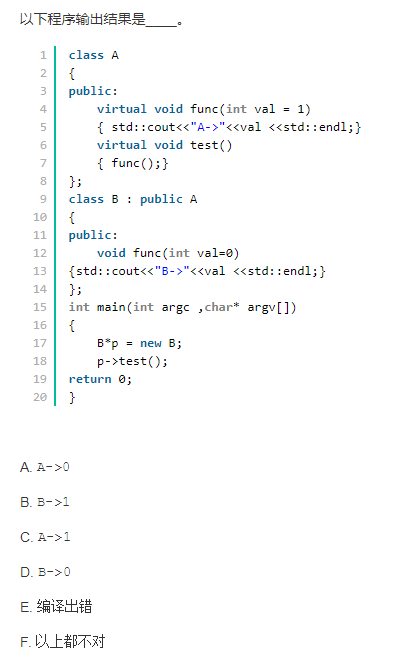条款37:绝不重新定义继承而来的缺省参数值

问题由来
做了牛客网上面的一道题目,觉得这题是理解条款37的最佳好题,于是顺便进行一下延伸讨论。题目如下:

PS: 正确答案B
程序代码
#include <iostream>
using namespace std;
class A
{
public:
virtual void func(int val = 1)
{
std::cout << "A->" << val << std::endl;
}
virtual void test()
{
func();
}
};
class B : public A
{
public:
void func(int val = 0)
{
std::cout << "B->" << val << std::endl;
}
};
int main(int argc, char* argv[])
{
A*p1 = new A;
A*p2 = new B;
//B*p3 = new A; //error
//B*p3 = dynamic_cast<B*> (new A); //dynamic_cast<B*>转化后, p3 = nullptr;
B*p3 = reinterpret_cast<B*> (new A);
B*p4 = new B;
//test()
p1->test(); //A->1
p2->test(); //B->1
p3->test(); //A->1
p4->test(); //B->1
//func()
p1->func(); //A->1
p2->func(); //B->1
p3->func(); //A->0
p4->func(); //B->0
return 0;
}#include <iostream>
using namespace std;
class A
{
public:
void func(int val = 1)
{
std::cout << "A->" << val << std::endl;
}
//这个test()的virtual可有可无
virtual void test()
{
func();
}
};
class B : public A
{
public:
void func(int val = 0)
{
std::cout << "B->" << val << std::endl;
}
};
int main(int argc, char* argv[])
{
A*p1 = new A;
A*p2 = new B;
//B*p3 = new A; //error
//B*p3 = dynamic_cast<B*> (new A); //dynamic_cast<B*>转化后, p3 = nullptr;
B*p3 = reinterpret_cast<B*> (new A);
B*p4 = new B;
//test()
p1->test(); //A->1
p2->test(); //A->1
p3->test(); //A->1
p4->test(); //A->1
//func()
p1->func(); //A->1
p2->func(); //A->1
p3->func(); //B->0
p4->func(); //B->0
return 0;
}从这两个进行对比,可知二者的参数传递值都是一样的,因此,缺省参数值采用的静态联编。
而virtual成员函数可以指针或者引用所指向的对象,决定采用什么样的具体实现函数,这是动态联编。
- 若文章有什么不足、错误,或者可以改进的地方,欢迎在留言中提出。Github上面可以获得更快的反馈,csdn可能会较慢。
- 本博文不支持长期更新,最新版博文请移步:我的Github





 本文通过两段C++代码示例探讨了缺省参数值的静态联编特性与virtual成员函数的动态联编特性之间的区别。通过对比不同情况下函数调用的行为,深入解析了C++中缺省参数及多态性的使用要点。
本文通过两段C++代码示例探讨了缺省参数值的静态联编特性与virtual成员函数的动态联编特性之间的区别。通过对比不同情况下函数调用的行为,深入解析了C++中缺省参数及多态性的使用要点。
















 1551
1551

 被折叠的 条评论
为什么被折叠?
被折叠的 条评论
为什么被折叠?








